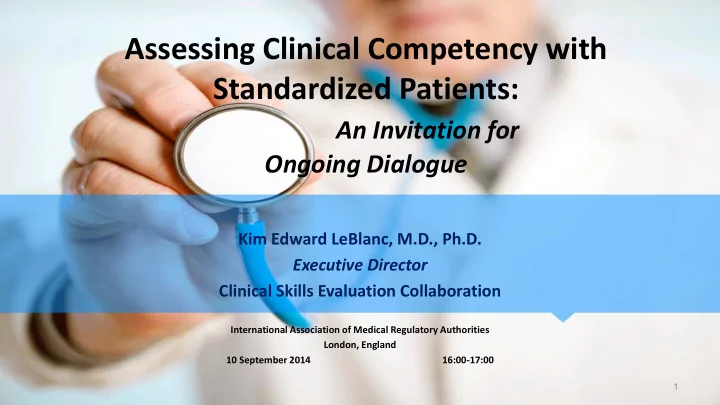

Assessing Clinical Competency with Standardized Patients: An Invitation for Ongoing Dialogue Kim Edward LeBlanc, M.D., Ph.D. Executive Director Clinical Skills Evaluation Collaboration International Association of Medical Regulatory Authorities London, England 10 September 2014 16:00-17:00 1
United States Medical Licensing Examination (USMLE) • Step 1 • Step 2 – Clinical Knowledge (CK) – Clinical Skills (CS) • Step 3 2
Clinical Skills Evaluation Collaboration ( CSEC ) A Collaborative Partnership between the Educational Commission for Foreign Medical Graduates ( ECFMG ) and the National Board of Medical Examiners ( NBME ). – Based in Philadelphia PA – Established in 2003 3
Educational Commission for Foreign Medical Graduates (ECFMG) Mission Statement The ECFMG promotes quality health care for the public by certifying international medical graduates for entry into U.S. graduate medical education, and by participating in the evaluation and certification of other physicians and health care professionals. 4
National Board of Medical Examiners (NBME) Mission Statement To protect the health of the public through state of the art assessment of health professionals . While centered on assessment of physicians, this mission encompasses the spectrum of health professionals along the continuum of education, training and practice and includes research in evaluation as well as development of assessment instruments . 5
History of CSEC • 1998 – Clinical Skills Assessment (CSA) • June 2001 – Discussions regarding collaboration initiated – Working groups formed • May 2003 – CSEC Collaboration Agreement signed • June 2004 – 1 st administration of USMLE Step 2 Clinical Skills (CS) examination 6
CSEC Today • 345,397 examinees tested (through 8/31/2014) • 4,144,764 Standardized Patient encounters • 54.2% USMGs – 187,356 • 45.8% IMGs – 158,041 7
Step 2 CS Volumes YEAR USMGs IMGs Total 2013 19,360 14,292 33,652 2012 19,319 13,974 33,293 2011 18,888 14,237 33,125 2010 19,485 14,466 33,951 2009 18,983 15,854 34,837 2008 17,711 17,513 35,224 2007 17,711 16,121 33,832 2006 17,473 15,132 32,605 8
Step 2 Clinical Skills Examination • Assesses application of medical knowledge, skills, and understanding of clinical science essential for the supervised patient care • Includes emphasis on health promotion and disease prevention, possessing fundamental skills for the safe, competent practice of medicine 9
Step 2 CS Examination • Each Step 2 CS examination consists of 12, twenty-five minute encounters. – 15 minutes with the standardized patient – 10 minutes for typed patient note • The examination lasts approximately 8 hours. Two breaks are provided: – 1 st break is 30 minutes long (lunch) – 2 nd break is 15 minutes long (snack). 10
Step 2 CS Examination • Uses standardized patients ( SP s) • Communication and Interpersonal Skills ( CIS ) • Spoken English Proficiency ( SEP ) • Integrated Clinical Encounter ( ICE ) – Physical examination – Patient Note • Data Gathering (DG) • Data Interpretation (DI) 11
Step 2 CS Examination Examinees are scored on three separate subcomponents: Communication and Interpersonal Skills ( CIS ) completed by the SPs Spoken English Proficiency ( SEP ) Integrated Clinical Encounter ( ICE ) Physical exam checklist completed by the SPs Patient note (scored by physicians) 12
Step 2 CS Examination • Standardized patients used to assess an examinee’s ability to: – gather information from patients, – perform physical examinations, – communicate their findings to patients and colleagues • The cases cover common and important situations that a physician is likely to encounter in clinics, doctors’ offices, and emergency departments in the United States 13
Step 2 CS Components • USMLE Step 2 CS is a Pass/Fail examination • Each of the three subcomponents (CIS, SEP, ICE) must be passed in a single administration in order to achieve a passing performance on Step 2 Clinical Skills exam 14
Patient Note 15
Patient Note • All notes are scored by Board-certified, practicing physicians • Psychometricians are directly involved in interpreting the scores and determining the pass/fail benchmarks 16
Assessing Clinical Skills Globally • Discussion: – Focus on how this is done in other countries – What are the differences? – What are the similarities? – Future directions • Enhanced physical findings/simulated pathology • Virtual reality – How can we work together to improve assessment? 17
Recommend
More recommend